- Home
- Barbara Pym
The Sweet Dove Died Page 2
The Sweet Dove Died Read online
Page 2
At last he could keep it to himself no longer. ‘I shall not be here this afternoon,’ he declared, ‘but I’m sure you and Miss Caton will manage perfectly well.’
James thought that they were certainly getting plenty of practice, but he was not impertinent by nature and did not say it.
‘I am taking Miss Eyre out to lunch,’ Humphrey went on, ‘and afterwards to that exhibition at Agnew’s which I think she will enjoy. Rather her kind of “thing”, I should imagine.’
‘Yes, I’m sure it will be,’ said James mildly. ‘Will you bring her here afterwards? She said she’d like to see the shop.’
‘I might. It depends how things go.’ Humphrey looked mysterious, then in case James should misunderstand him added hastily: ‘She may be too tired to come down to Sloane Square. I imagine she isn’t very strong. She may wish to go home.’
‘Oh, quite,’ said James, now bored with the subject. ‘Do give Miss Eyre my kind regards or whatever seems suitable.’
‘I shall certainly do that,’ said Humphrey.
Humphrey’s invitation to lunch and the exhibition had taken Leonora unawares, before she had been able to ‘find herself’ near Sloane Square and to pay a surprise visit to the shop. She was a little piqued to have matters taken out of her hands and quite ridiculously disappointed when she found that she and Humphrey were to lunch alone, without James. She had been looking forward to meeting him again —one needed the company of young people sometimes and that of good-looking young men was always particularly agreeable. Being with Humphrey was really not much different from being with any other of her elderly admirers who took her to expensive restaurants and plied her with compliments.
The exhibition was delightful, certainly, family portraits from great houses, and very much to Leonora’s taste.
Definitely her cup of tea, thought Humphrey inelegantly, as he watched her admiring the pictures; it had been a good idea.
‘Not doing any more bidding, I hope?’ he asked in a teasing way.
‘Certainly not!’ she said. ‘I shall get you to do all that for me in future. You or James, that is. I hope he’s well?’
‘James? Well?’ Humphrey seemed puzzled, for why should his nephew be anything but well? ‘Oh, yes,
James is well, thank you. I left him in charge this afternoon.’
‘Could we perhaps surprise him? I’ll pretend to be a customer.’
‘My dear Leonora’—they had reached the stage of Christian names in the middle of lunch — ‘by all means, if you’re sure you’re not too tired.’
‘I might buy a few Christmas presents.’
‘Goodness, is it nearly Christmas?’ said Humphrey. ‘I suppose women start their shopping much earlier than we do.’ He thought rather unworthily of one or two things in the shop that Leonora might be persuaded to buy if she were really looking for Christmas presents, but there seemed to be no question of that when they got there. Although she admired a pair of Chinese quails, shuddered at a piece of netsuke, and went into raptures over a Victorian paperweight, she did not ask the price of anything. All that came of it was that Humphrey made a mental note that a paperweight of some kind, perhaps a little less expensive than the one she had admired, might make an acceptable Christmas present for her.
Leonora looked at her watch. ‘I ought to be going,’ she said. ‘One wouldn’t want to be caught in the rush hour.’
‘I’ll run you home,’ said James, who had been kept rather in the background up till then.
‘Oh, no, my dear boy,’ said Humphrey. ‘No need for that. My car is parked round the corner.’
‘So is mine,’ said James, ‘and I go in Miss Eyre’s direction.’
Leonora stood between the two of them, smiling.
People were so kind. ‘I mustn’t take you out of your way,’ she said to Humphrey. ‘If James really is going vaguely in my direction…’
In James’s car she leaned back and drew her fur collar up round her neck. He asked if she felt a draught from the open window.
‘No, it’s just that I like the feeling of fur next to my face.’
‘I suppose it must be nice,’ said James, who had not experienced it. He felt rather shy, as if her remark had been too intimate for the early stages of an acquaintance, and was unable to think of any more to say.
‘Your uncle lives in Kensington, doesn’t he?’ Leonora asked. ‘One wouldn’t have wanted to put him to any trouble, especially when he’s been so kind.’
‘I’m sure he wouldn’t have thought it any trouble,’ said James. ‘After all, it doesn’t take long in a car.’
‘You live in Notting Hill Gate, I believe?’
‘Yes, I’ve got a flat.’
‘You don’t live with your family, then? No, of course you wouldn’t.’
‘Well, I haven’t got any family,’ said James, embarrassed. ‘My parents are both dead.’
‘You poor boy.’ Leonora was afraid her reply sounded too light and insincere, but what could one say? They drove without speaking for some time until James began to ask her how best to get to her house. When they reached it he got out of the car and went round to open the door for her.
‘Would you like to come in and have a drink?’ Leonora asked in a cool, almost indifferent tone.
James hesitated. Was she just being polite? he wondered. And did he really want to? He was curious to see the inside of her house and he could pretend a later engagement if it seemed difficult to get away.
‘I expect you’re going out,’ Leonora said.
‘No, I’d love to. I only thought it might be a bore for you.’
‘My dear James,’ she addressed him by his name for the first time, ‘would I have asked you if I’d thought that?’
There could be no answer to this so he followed her into the sitting-room. It was prettily furnished with small early Victorian pieces and china and glass objects of the same period. James noticed that the flower book she had bought at the sale was displayed on a little table.
‘I open it at a different page every day,’ Leonora said. ‘It really is so charming. I can’t remember now what I chose for today.’
‘Pink convolvulus,’ said James, looking down at the book.
‘And that signifies’—Leonora came to his side and made as if to read, though she knew that she couldn’t without her glasses.
‘Worth sustained by Tender and Judicious Affection,* James read in a slightly mocking tone, for he was not sure what it meant.
‘Let’s have a drink,’ said Leonora, going to a corner cupboard and bringing out a decanter and glasses.
‘You obviously like Victorian things—Victoriana, I suppose I should say.’
‘Yes, I adore them. Somehow I feel they’re me.’
James looked at Leonora with more interest. She was wearing a soft prune-coloured dress which suited her pale complexion and dark, well-arranged hair. In the more flattering light of the converted oil lamps she seemed younger than in the daylight, or if not exactly young, then of no particular age.
‘I think Victoriana do suit you,’ he said, ‘you look exactly right in that chair.’
Leonora bowed her head in acknowledgement of the tribute, for she was used to receiving compliments gracefully.
‘I think you belong to some earlier period,’ she mused. ‘Perhaps the eighteenth century? One can imagine a portrait of you leaning against a ruined pillar.’
‘I wouldn’t know,’ said James, feeling a little foolish now and wishing he hadn’t paid her that rather silly compliment.
‘You don’t look at all like your uncle.’
‘No, I take after my mother’s side.’
‘Golden-brown hair and dark eyes —rather unusual.’
‘My mother was American.’
‘Really? Do tell me about her.’ Leonora expressed what seemed to be a genuine interest, but James was embarrassed at the way the conversation was going. Sympathetic as she was, even he was perceptive enough to realise that Leonora would hardl
y want to spend the evening talking about his mother.
And now, almost as if she read his thoughts, Leonora gently changed the subject without seeming to and when she suggested that he might be hungry he found himself agreeing that he was.
‘I’ll see if I can find something for us to eat, then.’
‘Oh, but I never expected …,’ James began. ‘And you won’t have anything in,’ he added tactlessly.
‘One always has something—tins and packets and eggs, and things in the fridge.’
‘I expect people often drop in to see you.’
‘Yes, of course.’
‘You don’t mind living alone, then?’
‘No—otherwise I wouldn’t.’
James saw that this must be so. There was nothing pathetic about Leonora, and he was as yet too young to assume that a woman living alone is always to be pitied.
‘What sort of neighbours have you got?’ he asked.
‘A young couple on one side and my friend Liz on the other.’
James seemed satisfied. ‘So they could get things for you if you were ill?’
‘Yes, of course. What happens to you when you’re ill?’
‘There’s a motherly soul in the flat below who likes fussing over me.’
Leonora felt a faint prick of dissatisfaction but made no comment. She had laid the meal—pate, salad and an omelette—at a round table in the kitchen. James ate heartily.
‘I hate modern clinical-looking kitchens,’ she said when he remarked how colourful the room was. ‘I chose this red paper to make it seem warmer and more lived in.’
After coffee James got up to go. ‘I have enjoyed this evening,’ he said, and really it was true. There was something remarkably sympathetic about Leonora, even if he was not yet quite sure how to cope with her. ‘You must come and see my flat sometime and advise me how to improve it.’
‘I should enjoy that,’ she said, ‘especially advising you.’
They were standing together on the doorstep when a loud harsh cry rent the night air.
‘My neighbour Liz breeds Siamese cats,’ Leonora explained. ‘I should have warned you.’
‘How odd—my neighbour has a Siamese cat, too.’
‘Lovely creatures,’ she said, in the tone of one who prefers to admire animals from a distance. Going back into the house she pitied, as she often did, poor Liz whose husband had ‘behaved so appallingly’ that she now loved cats more than people.
And now there was another sound —men’s voices raised in a noisy quarrel. But there was no need for alarm—it was the radio belonging to Miss Foxe who lived on the top floor of the house. It was always too loud but Leonora preferred this violent altercation to the morning religious programme which, with the well-modulated voices singing hymns and the clergyman intoning prayers, always made her feel guilty. Yet it was hardly her fault that Miss Foxe should have been already in the house when Leonora came to it and that she was a person of gentle birth and refinement living in reduced circumstances. One just did not want people like Miss Foxe impinging on one’s life; no wonder she had not told James about her when he had asked who her neighbours were.
IV
As Christmas approached Leonora found herself wondering whether Humphrey and James, especially perhaps the latter, would do anything to mark the occasion. They might well send a card, possibly a printed one from the antique shop; that was the least they could do, but there were other, more subtle, gradations of behaviour that she might be justified in expecting. At last a card came from James—a Spanish madonna obviously chosen with care, signed just ‘James’. Then Humphrey’s card arrived—a large Victorian snow scene with his name and private and business addresses printed inside; but ‘Humphrey Boyce’ had been crossed out and ‘Humphrey’ scrawled over it in handwriting. Two days before Christmas a registered parcel was delivered containing a paperweight, perhaps the very one she had admired in the shop that afternoon, from Humphrey. It looked charming on her desk downstairs in the sitting-room; but it was James’s card that stood on her bedside table.
Christmas Day itself passed in the rather mysterious way that the Christmas Days of middle-aged people without young families usually do pass. Leonora believed that James was spending the holiday skiing in Austria with friends; she did not know what Humphrey was doing nor was she particularly curious. Her own day was spent entertaining her neighbour Liz to an elegant dinner which Liz hardly appreciated, being so much taken up with her cats that she had to leave the table at intervals to see if they were enjoying the turkey liver she had provided for them.
It was a relief to return to normal life again and to get through New Year’s Eve, with its feeling of sadness. The days began to lengthen and the first signs of spring appeared. In the meantime social life had started up again, by which Leonora meant her ‘new’ social life with Humphrey and James. There were visits to sales and exhibitions, theatres, ballet and the opera, and luncheon and dinner parties in Humphrey’s flat or Leonora’s house. Then Humphrey went abroad on business for a fortnight and when he came back discovered that James and Leonora had been meeting almost every day and had established a curiously intimate relationship. He is like a son to her, Humphrey thought, and since James had lost his mother the situation seemed not inappropriate, though in another way it was as if Leonora, by directing her attention to the young nephew rather than the eligible widower uncle, was showing again that streak of perverseness that had led her to bid for herself at the book sale. One day, Humphrey flattered himself, she would become bored with the novelty of James’s youth and realise the more lasting qualities—virtues, almost—of a man nearer her own age who was tall and had kept his figure and was bald only in the most distinguished kind of way.
James saw Leonora as a confidante rather than a mother, somebody to whom he could reveal his hopes and ambitions, such as they were, and most of the happenings of his daily life. Of course he could not tell her quite everything, and she liked to tease him about the parties he went to and the people he must meet —’your secret life’, she called it, as if by making a joke of it she could ensure that he would never deceive her. ‘We must find you a nice girlfriend,’ she would sometimes say, almost as if she really meant it.
One evening Leonora was sitting alone by the fire reading a novel by Elizabeth Bowen, when the front door bell rang. She knew that it couldn’t be James, for he had told her that he was going to a party that evening, which he didn’t expect to enjoy. It was comforting to know that if she had hinted that she might be lonely he would have stayed with her, but of course she had urged him to go, saying that she was sure he would enjoy it when he got there, the sort of thing one said to a child. Yet she did not want him to enjoy himself all that much and this thought gave her an almost cosy feeling as she sat with her book, sometimes gazing into the fire. She was annoyed at being interrupted and got up to answer the bell with a bad grace.
Meg was standing on the doorstep. Her manner was extremely agitated. ‘Have you seen Colin anywhere?’ she cried, almost in tears. ‘I’m trying everyone who knows him, just in the hope …’
‘Why on earth should I have seen Colin?’ Leonora asked coolly, drawing Meg into the house. ‘You’d better come in and get warm and let me give you a drink or something.’
Meg allowed herself to be led to the fire and placed in a chair. Leonora took her old sheepskin jacket, holding it at arm’s length as if it were the pelt of a not very clean animal, and hung it up in the hall. Meg looked a sight, she thought dispassionately, in a dusty black polo sweater and baggy green corduroy trousers. Her hair was standing out in a bush and her face was red and swollen and streaked with tears. Leonora averted her gaze as she handed her a glass of whisky—how could she bear to be seen in such a state? ‘You look terrible,’ she said. ‘What’s happened?’
A confused story came out. Apparently Colin hadn’t been to see her over Christmas, hadn’t even come to collect his present, and when she had phoned him he had seemed cold and evasive. That
had been weeks ago and she hadn’t heard a word since then. There was no answer from his flat and he had ignored two letters she had written.
‘I expect he’s gone somewhere with his friend,’ said Leonora soothingly. ‘Harold’ she remembered, but she did not specify which friend in case there had been a change.
‘Well, he could be with Harold and his mother in Gidea Park,’ Meg agreed, if a little doubtfully.
Leonora tried not to smile at the idea of Gidea Park, wherever that might be.
‘But Harold’s mother isn’t on the phone, so I don’t know what to do.’
‘Haven’t there been other times like this?’ Leonora asked delicately.
‘Oh, yes, but never as long as this. I’m beginning to think something must have happened to him. Of course Harold’s very jealous, I do know that.’
‘I shouldn’t worry,’ said Leonora. ‘You make far too much fuss of Colin, you know.’
‘But he’s all I’ve got,’ Meg cried, her voice breaking.
Leonora turned away in distaste. Soon Meg would say that she had always longed for a child and in the next instant she did. Leonora regretted having offered whisky; strong coffee, though more trouble to make, would have been just as efficacious.
‘Colin’s a very selfish young man,’ she said, a little smugly, perhaps thinking of James though of course there could really be no comparison. ‘He’ll be in touch as soon as he needs you again.’
Meg’s ravaged face glowed. ‘Do you think so?’ she said fondly. ‘Yes, I expect he will. But it’s so awful, this uncertainty …’
She seemed about to burst into tears again so Leonora tried to change the subject or at least move to some different aspect of it. ‘Why don’t you go and have your hair done tomorrow?’ she suggested. ‘Then you’ll be looking elegant when he does turn up again.’
Meg smiled, perhaps at the idea that she could ever be ‘elegant’, and raised a hand to her head. ‘Yes, I must. I know I look awful, but Colin never notices things like that. I’ve got a bottle of Yugoslav Riesling in the fridge,’ she added, ‘it’s his favourite wine.’

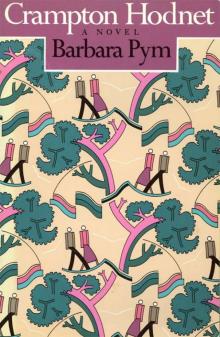 Crampton Hodnet
Crampton Hodnet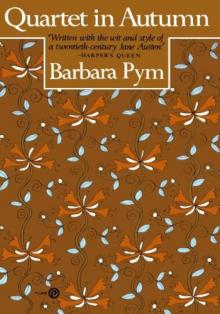 Quartet in Autumn
Quartet in Autumn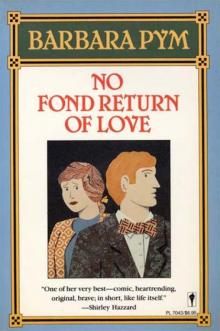 No Fond Return of Love
No Fond Return of Love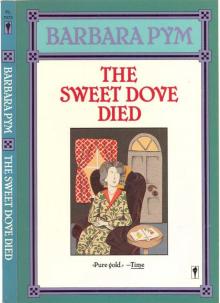 The Sweet Dove Died
The Sweet Dove Died Excellent Women
Excellent Women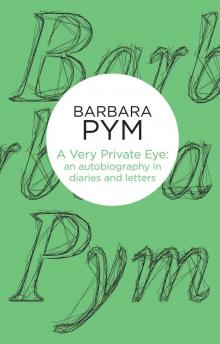 A Very Private Eye: The Diaries, Letters and Notebooks of Barbara Pym
A Very Private Eye: The Diaries, Letters and Notebooks of Barbara Pym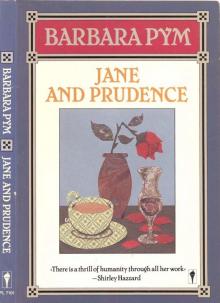 Jane and Prudence
Jane and Prudence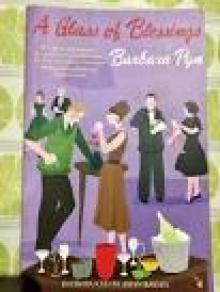 A Glass of Blessings
A Glass of Blessings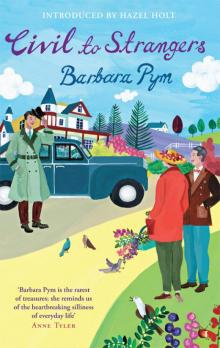 Civil to Strangers and Other Writings
Civil to Strangers and Other Writings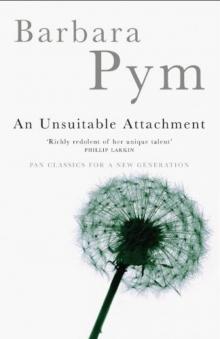 An Unsuitable Attachment
An Unsuitable Attachment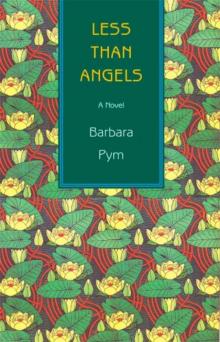 Less Than Angels
Less Than Angels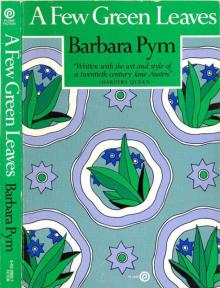 A Few Green Leaves
A Few Green Leaves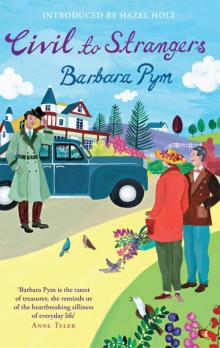 Civil to Strangers
Civil to Strangers